 Christina Coughlan, PhD
Christina Coughlan, PhD
AD-Exo as a Plasmid-Based Diagnostic for Alzheimer’s Disease
The onset of neuropathology in Alzheimer’s disease (AD) can precede clinical symptoms by 20 years. One of the major roadblocks in developing new interventions and understandings of AD pathology is the lack of sensitive, specific, and minimally invasive biomarkers for diagnosing, monitoring, and treating this disease. Since this devastating neurodegenerative disorder affects approximately 7 million people in the U.S. with no cure and limited therapeutic options, there is a critical need for accessible and accurate AD testing platforms. CU Anschutz Assistant Professor of Neurology Christina Coughlan, PhD, and her team have developed an Exosome-based diagnostic test (AD-Exo) that can distinguish AD patients from controls with an accuracy matching that of AD PET imaging. Notably, AD-Exo can also reliably detect sex differences in those with mild-cognitive impairment and AD; important for our understanding of the two-fold higher risks for women developing AD. The Grubstake Award will fund experiments that expand disease knowledge through increased patient monitoring enabling this team to move forward with the FDA IND application process.
 Jay Hesselberth, PhD
Jay Hesselberth, PhD
Universal ASO Platform for Cryptic Exon Correction Across Genetic Diseases
Antisense oligonucleotide (ASO) therapies have demonstrated remarkable clinical success for genetic diseases, but the cost of required toxicology studies remains a critical economic barrier limiting their development for rare diseases. CU Anschutz Professor Jay Hesselberth, PhD, in collaboration with Suja Jugannathan, PhD, and Scott Demarest, MD, have developed a therapeutic platform that focuses on mutation-agnostic ASO therapies targeting cryptic exon splicing defects in rare diseases. Cryptic exons arise when intronic mutations activate normally inactive splice sites, leading to inclusion of exons containing premature stop codons. The team has developed a unique approach to systematically identify clinically relevant cryptic exons across the genome. This systematic approach has generated a database of clinically actionable cryptic exon targets, providing a strategic advantage in therapeutic candidate selection compared to ad hoc target discovery approaches. Gates Grubstake funding will enable the team to complete critical proof-of-concept validation that will transform promising laboratory discoveries into foundation-ready therapeutic candidates.

 Wyatt Shields, PhD, and Benjamin Bitler, PhD
Wyatt Shields, PhD, and Benjamin Bitler, PhD
Macrophage Backpacks for Delivering Olaparib to High-Grade Serous Carcinomas
High-grade serous carcinoma (HGSC) remains the most lethal ovarian cancer subtype. Drugs known as poly(ADP-ribose) polymerase inhibitors (PARPi), including olaparib (OLAP), are commonly used as maintenance therapy following response to platinum chemotherapy. Although OLAP provides an increased benefit for BRCA-mutated tumors, it is limited by systemic toxicities and a rare but serious risk of developing blood cancers such as myelodysplastic syndrome and acute myelogenous leukemia. Dr. Wyatt Shields, Assistant Professor in the CU Boulder Department of Chemical and Biological Engineering , in collaboration with Dr. Benjamin Bitler, Associate Professor in the CU Anschutz Division of Reproductive Sciences, and CU PhD student Courtney Bailey, addressed these barriers with a targeted delivery system utilizing a macrophage-bound discoidal particle (“backpack”; Mac-BP). Backpacks are fabricated from a biodegradable polymer that enables controlled drug release. Their discoidal geometry prevents phagocytosis, allowing stable attachment to macrophages and subsequent trafficking and delivery to tumors, thereby reducing undesirable side effects. The Gates Grubstake funding will help support readiness for IND-directed development to enable clinical translation of Mac-BPs.
 Natalia Vergara, PhD
Natalia Vergara, PhD
Development of a Novel Therapy to Prevent Vision Loss in Age-Related Macular Degeneration
Age-related macular degeneration (AMD) is the leading cause of irreversible vision loss in adults over 60, impacting over 200 million people worldwide. Dry-AMD is the most common form of AMD, accounting for 90% of cases, for which there is currently no cure. Existing treatments can modestly slow lesion growth but fail to preserve vision. Dr. Natalia Vergara, Assistant Professor in the Department of Ophthalmology, along with Dr. Mi-Hyun Nam and Dr. Ram Nagaraj, both previous Grubstake Award recipients, and Dr. Marc Mathias, have developed a gene therapy that delivers a multifunctional peptide designed to target several of the cellular mechanisms driving dysfunction and cell death in AMD. By addressing multiple disease pathways simultaneously, this approach has the potential to limit retinal degeneration more effectively than single-target therapies. The Grubstake Award will support critical preclinical and human retinal organoid studies, positioning the team for an initial FDA INTERACT meeting and advancing this promising therapy toward clinical trials.
 Ram Nagaraj, PhD
Ram Nagaraj, PhD
Gene Therapy for Diabetic Retinopathy
Diabetic retinopathy (DR) is a significant complication of diabetes and accounts for half of all global blindness cases due to vascular damage marked by the breakdown of the blood-retinal barrier. However, there are no treatments that specifically target capillary cell death to prevent vison loss in these patients. Ram Nagaraj, PhD, professor of ophthalmology at CU Anschutz, has identified a gene that preserves the function of these retinal endothelial cells that can be intravitreally administered as a single dose gene therapy for protection against DR. The Grubstake Award will enable optimization of this therapeutic and investigational new drug (IND)-enabling studies to bring this technology to clinical trials.

 Mike Verneris, MD, and Traci Lyons, PhD
Mike Verneris, MD, and Traci Lyons, PhD
Sema7a Targeted CAR T-cells for Women’s Cancer
Breast and ovarian cancers propose a significant global health challenge due to their high incidence, poor outcomes and limited options following relapse. CU Anschutz Professor Traci Lyons, PhD, demonstrated that semaphorin 7a (Sema7a) is highly expressed on both breast and ovarian cancers and its expression is associated with aggressive disease, immune suppression and chemotherapy resistance. Her group demonstrated that targeting Sema7a with a neutralizing monoclonal antibody can regulate tumor cell growth. Building on this, CU Anschutz Professor Michael Verneris, MD, and his team designed a chimeric antigen receptor (CAR) construct targeting Sema7a using the DNA sequence from Lyons' group and demonstrated that anti-Sema7a CAR T cells possess superior efficacy. The Grubstake Award will fund experiments optimizing Sema7a CAR T-cell constructs as well as provide support for safety and toxicology studies enabling this team to move forward with the FDA IND application process.
 Zhirui Wang, PhD
Zhirui Wang, PhD
CCR4 Immunotoxin for Breast Cancer Immunotherapy via Treg Depletion
Triple negative breast cancer (TNBC) represents 15% of all breast cancer incidence and 40% of all breast cancer-related mortality. TNBC responds well to chemotherapy initially but tends to recur more frequently than other breast cancer subtypes. Recently, the use of immunotherapies inhibiting immune checkpoints have been used to treat TNBC with limited efficacy due to the infiltration of CCR4+ regulatory T cells (Tregs) causing an immunosuppressive phenotype. CU Anschutz Professor of Surgery Zhirui Wang, PhD, and his team have developed a diphtheria-based immunotoxin that targets and depletes CCR4+ Tregs in the tumor microenvironment for increased efficacy of immunotherapies. The Grubstake Award will fund pre-clinical efficacy studies to prepare for National Cancer Institute Small Business Technology Transfer (STTR) Fast Track grant for IND-enabling studies.
 Christian Young, PhD
Christian Young, PhD
First-in-class topical biologic to treat atopic dermatitis
Atopic dermatitis (AD), the most common eczema type, affects over 25 million in the U.S. Unlike allergic dermatitis and chronic hives, AD lacks effective long-term treatment. Newly FDA-approved systemic drugs help control moderate-to-severe cases, however, not all patients respond, resistance can develop, and severe side effects may occur. Christian Young, PhD, assistant professor of pathology, and his team have developed Tat-PYC-Smhad7, a protein therapeutic featuring a truncated human Smad7 that rapidly penetrates cells upon contact. This first-in-class topical biologic combats inflammation in AD patients while promoting epithelial healing. The Grubstake award will support pivotal clinical trials in dogs with atopic dermatitis, providing proof of efficacy and dose determination to mitigate risks for future human trials.
 Yuwen Zhu, PhD
Yuwen Zhu, PhD
Developing a humanized GPR182 blocking mAb for immunotherapy
Immunotherapy and adaptive cellular therapies (ACTs), like chimeric antigen receptor (CAR) T cells, have provided opportunities for treatment and prolonged survival in patients with malignancies that historically have limited or no options. However, only 20%-30% of patients benefit from these treatment modalities because of the immunosuppressive tumor microenvironments limiting the infiltration of CD8+ T-cells, immunotherapies and ACT. Yuwen Zhu, PhD, associate professor of surgery, has shown that blocking GPR182 can increase intratumoral immune effector cells infiltration, thereby sensitizing immunologically cold tumors to existing immunotherapies. The Grubstake Award will fund experiments to further characterize the monoclonal antibody and perform safety and toxicity studies in preparation for IND filing and clinical trials.
 Mayumi Fujita, MD, PhD, professor of dermatology: Modified CD4+ T Cells Expressing IL-37
Mayumi Fujita, MD, PhD, professor of dermatology: Modified CD4+ T Cells Expressing IL-37
There are no curative treatments for autoimmune diseases and although much progress has been made to manage symptoms clinically, many patients still fail to respond. One promising and potentially curative therapeutic strategy is infusing patients with regulatory T cells (Tregs) to reduce immunogenicity. However, Treg therapies have had poor efficacy due to a lack of persistence, loss of function, and limited expansion capacity. CU Anschutz Professor Mayumi Fujita, MD, PhD, and her team have identified a gene that when expressed in conventional CD4 T cells, can polarize them to become Tregs. Furthermore, these Tregs retain their immunosuppressive function, have improved expansion, and persist in various in-vivo disease models. With the Grubstake Award, Fujita will conduct IND-enabling studies to bring the technology closer to clinical trials.
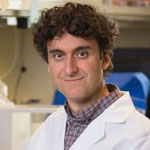 Jordan Jacobelli, PhD, associate professor of immunology and microbiology: Engineered CAR T Cells for Improved Solid Tumor Rejection
Jordan Jacobelli, PhD, associate professor of immunology and microbiology: Engineered CAR T Cells for Improved Solid Tumor Rejection
One of the limiting factors for effective CAR T-cell therapy against solid tumors is the lack of T-cell infiltration into the solid tumor. Jordan Jacobelli, PhD, associate professor at CU Anschutz, has identified a novel gene that when overexpressed in T cells, improves T-cell infiltration into the tumor by up to five times. The Grubstake Award will enable Jacobelli to move his technology through the proof-of-concept phase.
 Joshua Thurman, MD, professor of medicine: C3d Targeted CAR T Cells for the Treatment of Solid Tumors
Joshua Thurman, MD, professor of medicine: C3d Targeted CAR T Cells for the Treatment of Solid Tumors
The treatment of solid tumors using CAR T cells has been limited by poor efficacy, which is in part due to the lack of suitable cancer-associated antigens. One mechanism that cancer cells use to evade CAR T-cells is downregulating the target antigen. CU Anschutz Professor Joshua Thurman, MD, and his team have found that the immune system tags tumor cells with C3d via the complement system, and this process does not depend on a single tumor antigen. As such, the Thurman lab is developing a C3d targeting CAR T cell to treat a variety of solid tumors. The Grubstake Award will allow the team to perform their initial proof-of-concept studies.
-(1).png?sfvrsn=a3dde0bb_0&MaxWidth=150&MaxHeight=150&ScaleUp=false&Quality=High&Method=ResizeFitToAreaArguments&Signature=DFD4021F8596472F6D46E16136120CDB642CDE94) Sujatha Venkataraman, PhD, associate research professor of pediatrics: Next-Generation CAR T-Cell Therapy for Diffuse Intrinsic Pontine Glioma
Sujatha Venkataraman, PhD, associate research professor of pediatrics: Next-Generation CAR T-Cell Therapy for Diffuse Intrinsic Pontine Glioma
For the last five decades, there has been a lack of significant advancement in the development of a treatment for diffuse intrinsic pontine glioma (DIPG), an aggressive brain tumor in children with a median survival of only 11 months. Sujatha Venkataraman, PhD, associate professor at CU Anschutz, has identified an antigen prominently expressed in DIPG tumors and engineered a novel CAR T-cell product that has effectively eradicated the tumor in diverse DIPG mouse models, quadrupling their life expectancy. Through the Grubstake Award, the Venkataraman lab will perform the necessary preclinical investigational new drug (IND)-enabling studies to move this technology to clinical trials, and ultimately, provide hope to individuals diagnosed with DIPG.
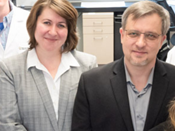 Ganna Bilousova, PhD, and Igor Kogut, PhD: Induced Pluripotent Stem Cell Services as a Platform for Clinical Research
Ganna Bilousova, PhD, and Igor Kogut, PhD: Induced Pluripotent Stem Cell Services as a Platform for Clinical Research
No cure exists for recessive dystrophic epidermolysis bullosa (RDEB), a genetic disease that causes severe skin blistering and scarring. CU Anschutz Associate Professors Ganna Bilousova, PhD, and Igor Kogut, PhD, are developing a stem cell-based therapy for RDEB using autologous induced pluripotent stem cells (iPSCs) derived from skin cells. One obstacle to the strategy is the inefficient reprogramming of adult somatic cells into iPSCs. To overcome this obstacle, the team has applied their patented RNA-based method to the skin cells and successfully improved iPSC reprogramming efficiency by close to 20-fold. The team intends to leverage their technology’s potential to improve reprogramming efficiency to treat a variety of diseases. As such, the second-tranche funding, which extends awards made in 2015 and 2022, will enable Bilousova and Kogut to perform the necessary proof-of-concept studies to determine the broader commercial potential of their technology by diversifying the source of adult somatic cells suitable for reprogramming.
Ganna Bilousova, PhD: Somatic Cell Rejuvenation for Skin Transplantation and Wound Healing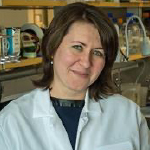 With a steady increase in the aging population, the care of acute and chronic wounds in the elderly has become a priority topic for clinicians. Many options to treat wounds are currently available. However, none of them restores the functionality of aged skin cells, hence low success rate in the elderly. Dr. Ganna Bilousova, Associate Professor at CU Anschutz, and Dr. Igor Kogut, Assistant Professor at CU Anschutz, are developing a permanent corrective therapy for acute and chronic wounds in the elderly by rejuvenating the patient’s own skin cells using a patent-pending RNA cocktail of factors. The Grubstake Award will allow their teams to finalize their therapeutic product and compare its efficacy with the competition to accelerate development toward pre-IND filing with the FDA.
With a steady increase in the aging population, the care of acute and chronic wounds in the elderly has become a priority topic for clinicians. Many options to treat wounds are currently available. However, none of them restores the functionality of aged skin cells, hence low success rate in the elderly. Dr. Ganna Bilousova, Associate Professor at CU Anschutz, and Dr. Igor Kogut, Assistant Professor at CU Anschutz, are developing a permanent corrective therapy for acute and chronic wounds in the elderly by rejuvenating the patient’s own skin cells using a patent-pending RNA cocktail of factors. The Grubstake Award will allow their teams to finalize their therapeutic product and compare its efficacy with the competition to accelerate development toward pre-IND filing with the FDA.
Mi-Hyun Nam, PhD: Restoration of Vision in Glaucoma through Cell Therapy 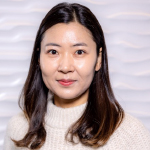 Dr. Mi-Hyun Nam (Research Instructor in Ophthalmology) and her co-PI, Dr. Natalia Vergara (Assistant Professor in Ophthalmology), received a Gates Grubstake Award for developing a human stem cell-based therapy for treating glaucoma, the second leading cause of blindness worldwide. Current medical therapies are limited to lowering intraocular pressure, which may prevent further vision loss, but no treatment to date can restore vision once it has been lost. With the Grubstake funding, they will perform preclinical studies to determine the feasibility and efficacy of their therapy.
Dr. Mi-Hyun Nam (Research Instructor in Ophthalmology) and her co-PI, Dr. Natalia Vergara (Assistant Professor in Ophthalmology), received a Gates Grubstake Award for developing a human stem cell-based therapy for treating glaucoma, the second leading cause of blindness worldwide. Current medical therapies are limited to lowering intraocular pressure, which may prevent further vision loss, but no treatment to date can restore vision once it has been lost. With the Grubstake funding, they will perform preclinical studies to determine the feasibility and efficacy of their therapy.
Mark (Eric) Kohler, MD, PhD: Adjunctive LAT-Activating Chimeric Antigen Receptor T cells (ALA-CART) Strengths  Mark (Eric) Kohler, MD, PhD, is an Assistant Professor in the Department of Pediatrics on the University of Colorado Anschutz Medical Campus. CAR-T cells have revolutionized the treatment of patients with relapsed leukemia and lymphoma, inducing responses against cancers that no longer respond to traditional therapies. Unfortunately, current CAR-T cell strategies are unable to induce long-term remissions in the majority of patients, owing to limitations in their persistence, potency and sensitivity. Through studying CAR-T cell signaling, the Kohler lab identified that inefficient activation of the molecule LAT was responsible for many of the limitations in current CAR-T cell therapies. Using this finding, we rationally designed a new Adjunctive LAT-Activating CAR-T cell (ALA-CART) that restores LAT signaling and demonstrates enhanced potency and persistence in preclinical models. Furthermore, ALA-CART cells demonstrated increased sensitivity to tumor cells with low levels of the targeted antigen, allowing for eradication of leukemia that would otherwise not be “seen” by current CAR-T cell therapies. These advancements hold the potential to close many of the vulnerabilities of CAR-T cell therapies and improve the long-term effectiveness of these therapies for patients. Grubstake funding will be used to generate the safety data and establish the manufacturing workflows at the Gates Biomanufacturing Facility that will be necessary to transition this work to future clinical trials.
Mark (Eric) Kohler, MD, PhD, is an Assistant Professor in the Department of Pediatrics on the University of Colorado Anschutz Medical Campus. CAR-T cells have revolutionized the treatment of patients with relapsed leukemia and lymphoma, inducing responses against cancers that no longer respond to traditional therapies. Unfortunately, current CAR-T cell strategies are unable to induce long-term remissions in the majority of patients, owing to limitations in their persistence, potency and sensitivity. Through studying CAR-T cell signaling, the Kohler lab identified that inefficient activation of the molecule LAT was responsible for many of the limitations in current CAR-T cell therapies. Using this finding, we rationally designed a new Adjunctive LAT-Activating CAR-T cell (ALA-CART) that restores LAT signaling and demonstrates enhanced potency and persistence in preclinical models. Furthermore, ALA-CART cells demonstrated increased sensitivity to tumor cells with low levels of the targeted antigen, allowing for eradication of leukemia that would otherwise not be “seen” by current CAR-T cell therapies. These advancements hold the potential to close many of the vulnerabilities of CAR-T cell therapies and improve the long-term effectiveness of these therapies for patients. Grubstake funding will be used to generate the safety data and establish the manufacturing workflows at the Gates Biomanufacturing Facility that will be necessary to transition this work to future clinical trials.
Daniel Sherbenou, MD, PhD: Response Prediction for T Cell Engaging Bispecific Antibodies in Multiple Myeloma Dr. Daniel Sherbenou is an Associate Professor in Hematology, Department of Medicine at the University of Colorado Anschutz Medical campus. Dr. Sherbenou received a Gates Grubstake Award to commercialize a new My-DST assay for profiling responses to T cell engaging bispecific antibodies for patients with multiple myeloma (MM). MM is an incurable blood cancer afflicting more than 150,000 Americans, and bispecific antibodies are a promising new class of therapy that redirect a patient’s own T cells to kill the cancerous myeloma cells. To improve the clinical application of these drugs, Myeloma Drug Sensitivity Testing (My-DST) has potential as a new laboratory test for measuring responses of an individual patient’s tumor cells from biopsy specimens. In this project, Dr. Sherbenou’s team will pursue regulatory approvals and scale up efforts to establish My-DST as a personalized medicine approach for the various bispecific antibodies in clinical use or in clinical trials.
Dr. Daniel Sherbenou is an Associate Professor in Hematology, Department of Medicine at the University of Colorado Anschutz Medical campus. Dr. Sherbenou received a Gates Grubstake Award to commercialize a new My-DST assay for profiling responses to T cell engaging bispecific antibodies for patients with multiple myeloma (MM). MM is an incurable blood cancer afflicting more than 150,000 Americans, and bispecific antibodies are a promising new class of therapy that redirect a patient’s own T cells to kill the cancerous myeloma cells. To improve the clinical application of these drugs, Myeloma Drug Sensitivity Testing (My-DST) has potential as a new laboratory test for measuring responses of an individual patient’s tumor cells from biopsy specimens. In this project, Dr. Sherbenou’s team will pursue regulatory approvals and scale up efforts to establish My-DST as a personalized medicine approach for the various bispecific antibodies in clinical use or in clinical trials.
Michael Verneris, MD: Multi-omic Approach to Establish Mechanisms of Efficacy of Stem Cell-Derived Innate Lymphoid Cells in Gastrointestinal Tract Repair Michael Verneris, MD, is a Professor in the Department of Pediatrics on the University of Colorado Anschutz Medical Campus. Innate lymphoid cells are tissue resident lymphocytes that can be restorative to injured mucosal tissues. In Crohn’s disease (CD), a subpopulation of ILCs (ILC3’s) are depleted and the loss of these cells is thought to be part of the pathogenesis of CD. Replacement of ILC3’s in CD may be therapeutic. Dr. Verneris’ laboratory has development methods to generate ILC3’s from hematopoietic stem cells and has found that adoptive transfer of these cells can improve the intestinal dysfunction in TNFdARE mice, which is a model of CD. With this funding they will perform CITE-SEQ and Xenium in situ analysis to on ILC3 treated (and untreated) mice to better understand the impact of ILC3’s adoptive transfer at single cell resolution. Additionally, they will continue to perform scale-up experiments with the goal of transferring this technology to the Gates Biomanufacturing Facility.
Michael Verneris, MD, is a Professor in the Department of Pediatrics on the University of Colorado Anschutz Medical Campus. Innate lymphoid cells are tissue resident lymphocytes that can be restorative to injured mucosal tissues. In Crohn’s disease (CD), a subpopulation of ILCs (ILC3’s) are depleted and the loss of these cells is thought to be part of the pathogenesis of CD. Replacement of ILC3’s in CD may be therapeutic. Dr. Verneris’ laboratory has development methods to generate ILC3’s from hematopoietic stem cells and has found that adoptive transfer of these cells can improve the intestinal dysfunction in TNFdARE mice, which is a model of CD. With this funding they will perform CITE-SEQ and Xenium in situ analysis to on ILC3 treated (and untreated) mice to better understand the impact of ILC3’s adoptive transfer at single cell resolution. Additionally, they will continue to perform scale-up experiments with the goal of transferring this technology to the Gates Biomanufacturing Facility.
Eduardo Davila, PhD: Manufacturing of Genetically Engineered Tumor Infiltrating Lymphocyte Therapy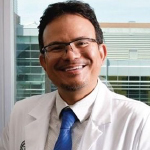 Eduardo Davila, PhD, is a Professor in the Division of Medical Oncology on the University of Colorado Anschutz Medical Campus. This funding will accelerate development toward pre-IND filing with the FDA by completing studies related to (1) specificity and potency assays to test TIL function, (2) investigate changes in the T cell repertoire, and (3) confirm that TILs do not become leukemic.
Eduardo Davila, PhD, is a Professor in the Division of Medical Oncology on the University of Colorado Anschutz Medical Campus. This funding will accelerate development toward pre-IND filing with the FDA by completing studies related to (1) specificity and potency assays to test TIL function, (2) investigate changes in the T cell repertoire, and (3) confirm that TILs do not become leukemic.
Nicholas Jacobson: Voxel Printed Microstructures with Cells for Patient Specific Coronary Stents
 Nicholas Jacobson is a research faculty member affiliated with the Inworks Innovation Initiative within the School of Engineering, Computation, and Design at the University of Colorado Denver and Anschutz Medical Campus. Nick and his team, which includes Dr. Mitchel Vedepo, a post-doctoral fellow in the Department of Bioengineering, and Dr. Gareth Morgan, the Director of Interventional Cardiology at Children's Hospital, received a Grubstake Award to design and test a 3D printed patient-specific heart valve with cellular ingrowth. The unique 3D printing technology that will be utilized was invented at Inworks and is currently being tested in numerous clinical studies for surgical planning. Building on this technology with biocompatible materials to focus on congenital heart disease will allow for over 800,000 patients to receive a heart valve replacement. This funding will accelerate development toward a working prototype for large animal testing.
Nicholas Jacobson is a research faculty member affiliated with the Inworks Innovation Initiative within the School of Engineering, Computation, and Design at the University of Colorado Denver and Anschutz Medical Campus. Nick and his team, which includes Dr. Mitchel Vedepo, a post-doctoral fellow in the Department of Bioengineering, and Dr. Gareth Morgan, the Director of Interventional Cardiology at Children's Hospital, received a Grubstake Award to design and test a 3D printed patient-specific heart valve with cellular ingrowth. The unique 3D printing technology that will be utilized was invented at Inworks and is currently being tested in numerous clinical studies for surgical planning. Building on this technology with biocompatible materials to focus on congenital heart disease will allow for over 800,000 patients to receive a heart valve replacement. This funding will accelerate development toward a working prototype for large animal testing.
Traci Lyons, Ph.D.: A Novel Therapeutic for Breast Cancer
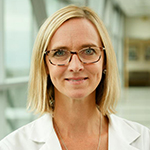 Dr. Traci Lyons is an Associate Professor in the Department of Medicine at the University of Colorado Anschutz Medical Campus. Dr. Lyons received a Gates Grubstake Award to perform animal testing of monoclonal antibody based therapeutic in-mouse models of breast cancer stem cells and postpartum breast cancers (PPBCs), which are defined as breast cancers diagnosed within 10 years of recent childbirth. PPBCs appear to be enriched for therapy-resistant cancer stem cells, which may account for the high rates of metastasis observed in these patients. The therapeutic antibody has already proven efficacious in multiple mouse models of breast cancer, and exploration of its role in killing breast cancer stem cells will be evaluated. Thus far, the antibody appears to have minimal toxicities in mice. Worldwide estimates of PPBC range from ~150,000 to 350,000 cases annually, based on global breast cancer and/or childbirth rates, respectively. Since PPBC 5-year survival rates of PPBCs are low, PPBC puts thousands of children at risk to grow up without their mothers. If successful, this therapeutic may result in life-extending or life-saving improvements by eliminating the effects, in part, of therapeutic resistance driven by cancer stem cell populations.
Dr. Traci Lyons is an Associate Professor in the Department of Medicine at the University of Colorado Anschutz Medical Campus. Dr. Lyons received a Gates Grubstake Award to perform animal testing of monoclonal antibody based therapeutic in-mouse models of breast cancer stem cells and postpartum breast cancers (PPBCs), which are defined as breast cancers diagnosed within 10 years of recent childbirth. PPBCs appear to be enriched for therapy-resistant cancer stem cells, which may account for the high rates of metastasis observed in these patients. The therapeutic antibody has already proven efficacious in multiple mouse models of breast cancer, and exploration of its role in killing breast cancer stem cells will be evaluated. Thus far, the antibody appears to have minimal toxicities in mice. Worldwide estimates of PPBC range from ~150,000 to 350,000 cases annually, based on global breast cancer and/or childbirth rates, respectively. Since PPBC 5-year survival rates of PPBCs are low, PPBC puts thousands of children at risk to grow up without their mothers. If successful, this therapeutic may result in life-extending or life-saving improvements by eliminating the effects, in part, of therapeutic resistance driven by cancer stem cell populations.
Michael Verneris, M.D.: Therapeutic Development of Innate Lymphoid Cells
 Dr. Michael Verneris, the Barton Endowed Chair of Pediatric Bone Marrow Transplant, received a Gates Grubstake Award to perform studies using stem cell-derived innate lymphoid cells. These tissue resident lymphocytes play a critical role in ameliorating intestinal inflammation and thus have promise in the treatment of intestinal inflammatory disorders, such as Crohn’s disease (occurring in ~1% of the population). Crohn’s disease is a devastating and life-threatening disorder that causes considerable physical, financial and societal burden. Dr. Verneris’s laboratory has pioneered techniques to differentiate hematopoietic stem cells into Innate lymphoid cells, paving the way for clinical trials of cellular therapy for patients with Crohn’s disease. Grubstake funding will be used to establish the activity of these cells in animal models, to scale these techniques to levels necessary to treat humans and to transfer this technology to the Gates Biomanufacturing Facility.
Dr. Michael Verneris, the Barton Endowed Chair of Pediatric Bone Marrow Transplant, received a Gates Grubstake Award to perform studies using stem cell-derived innate lymphoid cells. These tissue resident lymphocytes play a critical role in ameliorating intestinal inflammation and thus have promise in the treatment of intestinal inflammatory disorders, such as Crohn’s disease (occurring in ~1% of the population). Crohn’s disease is a devastating and life-threatening disorder that causes considerable physical, financial and societal burden. Dr. Verneris’s laboratory has pioneered techniques to differentiate hematopoietic stem cells into Innate lymphoid cells, paving the way for clinical trials of cellular therapy for patients with Crohn’s disease. Grubstake funding will be used to establish the activity of these cells in animal models, to scale these techniques to levels necessary to treat humans and to transfer this technology to the Gates Biomanufacturing Facility.
Chaitanya Puranik, B.D.S., M.S., M.Dent.Sci., Ph.D.: Dental Filling for Regeneration of Dental Pulp
 Dr. Puranik is an Assistant Professor and Director of Predoctoral Dental Education in the Department of Pediatric Dentistry at the School of Dental Medicine and Children’s Hospital Colorado, University of Colorado Anschutz Medical Campus. Dr. Puranik and his co-PIs, Drs. Devatha Nair and Michael Schurr, received a Gates Grubstake Award to develop a dental coating for dental pulp regeneration. Dental pulp is the living part of a tooth with blood vessels, nerves, and connective tissue. Unlike the outer covering of the teeth, pulp houses numerous stem cells which are capable of regenerative response after an insult, such as deep dental caries. Damage to dental pulp can cause patients to need root canals or even suffer the loss of their teeth. The annual estimated health care expense for management of dental caries in children alone is $5.2 billion. This funding will help complete studies for pre-IND filing with the FDA.
Dr. Puranik is an Assistant Professor and Director of Predoctoral Dental Education in the Department of Pediatric Dentistry at the School of Dental Medicine and Children’s Hospital Colorado, University of Colorado Anschutz Medical Campus. Dr. Puranik and his co-PIs, Drs. Devatha Nair and Michael Schurr, received a Gates Grubstake Award to develop a dental coating for dental pulp regeneration. Dental pulp is the living part of a tooth with blood vessels, nerves, and connective tissue. Unlike the outer covering of the teeth, pulp houses numerous stem cells which are capable of regenerative response after an insult, such as deep dental caries. Damage to dental pulp can cause patients to need root canals or even suffer the loss of their teeth. The annual estimated health care expense for management of dental caries in children alone is $5.2 billion. This funding will help complete studies for pre-IND filing with the FDA.
Jeffrey Olson, MD: Intraocular Device to Potentiate Retinal Stem Cell Transplantation in Macular Degeneration
Dr. Jeffrey Olson, Associate Professor of Ophthalmology at the Sue Anschutz-Rodgers Eye Center, used the first round of Grubstake funding to develop and test a prototype device for reducing intraocular inflammatory proteins associated with blinding conditions such as age-related macular degeneration (AMD) and diabetic retinopathy (DR). This preclinical pilot data catalyzed the formation of a startup company, AmpVision, which is actively pursuing NIH and NSF grants as well as private funding. The second tranche of Grubstake funding will help to move this technology into the FDA approval process with the goal of conducting First-in-Man studies.
Holger Russ, PhD: Generation of Functional, Patient Specific Thymi for Cell Therapy
Dr. Holger Russ is an Assistant Professor, Pediatrics in the Barbara Davis Center at the University of Colorado Anschutz Medical Campus. With the support of Grubstake funds, Dr. Russ has developed approaches to generate a functional patient-specific thymus from stem cells that has garnered considerable interest from business partners. Second tranche funding will allow Dr. Russ to conduct critical proof of principle experiments using preclinical animal models. These efforts are geared towards transitioning his technology into an industry setting with the goal to conduct clinical trials in the near future.
David Wagner, PhD: A 15-Amino Acid Peptide to Potentially Stop Demyelination and Restore Myelin Production in Multiple Sclerosis
Dr. David Wagner, an Associate Professor, Medicine – Pulmonary Sciences & Critical Care and Head, Immunology Section, is also the CSO of Op-T, LLC, a startup out of the University of Colorado Anschutz Medical Campus. Op-T, LLC has successfully conducted a Phase 1a clinical trial for the treatment of autoimmune inflammation using a therapeutic peptide, OPT101, developed in part using the original Grubstake Award. In conjunction with the Colorado State University Veterinary Teaching Hospital in Fort Collins, CO, and partially supported by Grubstake Second Tranche funding, the efficacy of a canine version of OPT101 (OPT501) was tested in diabetic dogs and showed remarkable improvements in dog health with owners commenting on increased activity and general wellbeing. This year’s Grubstake Second Tranche funding will continue to support studies in Type 1 diabetes and well as developing OPT601 for multiple sclerosis.
Ulli Bayer, Ph.D.: Pharmacological Restoration of Ischemic Spinal Cord Damage
 Dr. Ulli Bayer, a Professor in the Department of Pharmacology at the University of Colorado Anschutz Medical Campus, is also the CSO of Neurexis Therapeutics, a startup out of the University of Colorado. Dr. Bayer received a Grubstake Award to perform animal testing of an optimized peptide therapeutic in a mouse model of ischemic spinal cord damage. The therapeutic has already been shown to have activity in animal models of global cerebral ischemia and to have no apparent safety concerns at the highest doses tested. The number of patients at risk for ischemic spinal cord damage is 15,000 per year, while follow on indications of global cerebral ischemia and stroke are 550,000 and 800,000 per year, respectively. This funding will accelerate development toward pre-IND filing with the FDA.
Dr. Ulli Bayer, a Professor in the Department of Pharmacology at the University of Colorado Anschutz Medical Campus, is also the CSO of Neurexis Therapeutics, a startup out of the University of Colorado. Dr. Bayer received a Grubstake Award to perform animal testing of an optimized peptide therapeutic in a mouse model of ischemic spinal cord damage. The therapeutic has already been shown to have activity in animal models of global cerebral ischemia and to have no apparent safety concerns at the highest doses tested. The number of patients at risk for ischemic spinal cord damage is 15,000 per year, while follow on indications of global cerebral ischemia and stroke are 550,000 and 800,000 per year, respectively. This funding will accelerate development toward pre-IND filing with the FDA.
Eduardo Davila, Ph.D.: Manufacturing of Genetically Engineered Tumor Infiltrating Lymphocyte Therapy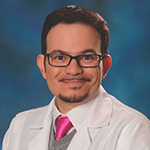 Dr. Eduardo Davila, a Professor in the Department of Medicine and the Amy Davis Chair of Basic Immunology Research, is the Director, Immunotherapy Medical Oncology and Director, Cancer Research Training and Education at the University of Colorado Comprehensive Cancer Center at the Anschutz Medical Campus and CEO of TrAMPoline a startup company out of the University of Maryland. Dr. Davila received a Grubstake Award to develop the manufacturing process for next generation tumor infiltrating lymphocyte (TIL) therapy at the Gates Biomanufacturing Facility. TIL therapy fills an important unmet medical need for the treatment of the 1.5 million new cases of solid tumors each year as more than 50% of patients relapse or do not respond to current immunotherapy. This funding will accelerate development toward pre-IND filing with the FDA.
Dr. Eduardo Davila, a Professor in the Department of Medicine and the Amy Davis Chair of Basic Immunology Research, is the Director, Immunotherapy Medical Oncology and Director, Cancer Research Training and Education at the University of Colorado Comprehensive Cancer Center at the Anschutz Medical Campus and CEO of TrAMPoline a startup company out of the University of Maryland. Dr. Davila received a Grubstake Award to develop the manufacturing process for next generation tumor infiltrating lymphocyte (TIL) therapy at the Gates Biomanufacturing Facility. TIL therapy fills an important unmet medical need for the treatment of the 1.5 million new cases of solid tumors each year as more than 50% of patients relapse or do not respond to current immunotherapy. This funding will accelerate development toward pre-IND filing with the FDA.
Michael Zuscik, Ph.D.: Abaloparatide as the First Chondroregenerative Therapy for Osteoarthritis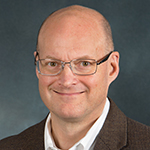 Dr. Michael Zuscik, the Mack Clayton Professor of Orthopedics and Vice Chair of Research, received a Grubstake Award to perform animal testing of a chondroregenerative peptide therapeutic for the treatment of osteoarthritis. Osteoarthritis is the most prevalent disease in the U.S., with 32 million patients diagnosed. The financial burden of disease is $185 billion, with lost wages and reduced productivity resulting in a financial toll of more than $300 billion. Dr. Zuscik’s prior work with another peptide, Forteo, that binds to the same receptor has shown positive interim results in a prospective double blind clinical trial. The Grubstake funding will drive the decision of whether to develop abaloparatide for the treatment of osteoarthritis.
Dr. Michael Zuscik, the Mack Clayton Professor of Orthopedics and Vice Chair of Research, received a Grubstake Award to perform animal testing of a chondroregenerative peptide therapeutic for the treatment of osteoarthritis. Osteoarthritis is the most prevalent disease in the U.S., with 32 million patients diagnosed. The financial burden of disease is $185 billion, with lost wages and reduced productivity resulting in a financial toll of more than $300 billion. Dr. Zuscik’s prior work with another peptide, Forteo, that binds to the same receptor has shown positive interim results in a prospective double blind clinical trial. The Grubstake funding will drive the decision of whether to develop abaloparatide for the treatment of osteoarthritis.
Ken Liechty, M.D.: Conjugated Nanoceria to Treat Inflammatory Disorders Including Pulmonary Fibrosis
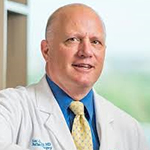 Dr.
Kenneth Liechty is the Sandy Wolf Chair in Maternal Fetal Surgery and Director of the Colorado Fetal Care Center for Children’s Hospital at the University of Colorado Anschutz Medical Campus. Dr. Liechty has received two Grubstake
Awards to develop his conjugated nanoceria therapeutic for the treatment of diabetic foot ulcers and ARDS and has filed pre-IND applications with the FDA for both indications. The second tranche of funding is designed to enable further manufacturing
at the Gates Biomanufacturing Facility in preparation for IND filing with the FDA.
Dr.
Kenneth Liechty is the Sandy Wolf Chair in Maternal Fetal Surgery and Director of the Colorado Fetal Care Center for Children’s Hospital at the University of Colorado Anschutz Medical Campus. Dr. Liechty has received two Grubstake
Awards to develop his conjugated nanoceria therapeutic for the treatment of diabetic foot ulcers and ARDS and has filed pre-IND applications with the FDA for both indications. The second tranche of funding is designed to enable further manufacturing
at the Gates Biomanufacturing Facility in preparation for IND filing with the FDA.
Holger Russ, Ph.D.: Generation of Functional Patient Specific Thymii for Cell Therapy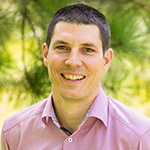 Dr.
Holger Russ is an Assistant Professor, Pediatrics in the Barbara Davis Center at the University of Colorado Anschutz Medical Campus. Dr. Russ used funds from the original Grubstake Award to develop and streamline his process for developing
a patient specific thymus in the lab. His ground-breaking research has elicited interest from industry who have requested some final proof of concept studies. The second tranche of funding will answer the questions posed by industry
and guide decision-making around patient benefit and commercialization.
Dr.
Holger Russ is an Assistant Professor, Pediatrics in the Barbara Davis Center at the University of Colorado Anschutz Medical Campus. Dr. Russ used funds from the original Grubstake Award to develop and streamline his process for developing
a patient specific thymus in the lab. His ground-breaking research has elicited interest from industry who have requested some final proof of concept studies. The second tranche of funding will answer the questions posed by industry
and guide decision-making around patient benefit and commercialization.
David Wagner, Ph.D.: Therapeutic for Myelin Loss/Regeneration in Multiple Sclerosis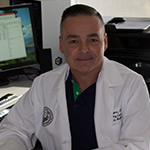 Dr.
David Wagner, an Associate Professor, Medicine – Pulmonary Sciences & Critical Care and Head, Immunology Section, is also the CSO of Op-T, LLC, a startup out of the University of Colorado Anschutz Medical Campus. Op-T, LLC is beginning
a Phase 1 clinical trial at UC Health for the treatment of type 1 diabetes using a therapeutic peptide, OPT101, developed in part using the original Grubstake Award. The second tranche of funding is designed to develop the second-generation
formulation of the therapeutic peptide and demonstrate its activity in animal models of type 1 diabetes and multiple sclerosis in preparation for additional IND filings with the FDA.
Dr.
David Wagner, an Associate Professor, Medicine – Pulmonary Sciences & Critical Care and Head, Immunology Section, is also the CSO of Op-T, LLC, a startup out of the University of Colorado Anschutz Medical Campus. Op-T, LLC is beginning
a Phase 1 clinical trial at UC Health for the treatment of type 1 diabetes using a therapeutic peptide, OPT101, developed in part using the original Grubstake Award. The second tranche of funding is designed to develop the second-generation
formulation of the therapeutic peptide and demonstrate its activity in animal models of type 1 diabetes and multiple sclerosis in preparation for additional IND filings with the FDA.
Terry Fry, M.D.: Optimized manufacturing of CD19xCD22 CAR expressing T cells for the clinic
 Refractory cancers are an increasing cause of early death in adults and children. Recent breakthroughs in cell based immunotherapeutic treatments (primarily CAR T cell therapy) are changing that rapidly, with hundreds of trials ongoing in the US and around the world. Although some patients may be cured with current monovalent CAR T cell therapy (targets only CD19), relapses shorten remissions in a majority of patients. Dr. Terry Fry and his team are developing a next generation bicistronic CAR T cell therapy (targets both CD19 and CD22) designed to prolong remissions in patients, improving patient well-being and decreasing healthcare costs. The Grubstake Award will allow them to develop the manufacturing process at the Gates Biomanufacturing Facility.
Refractory cancers are an increasing cause of early death in adults and children. Recent breakthroughs in cell based immunotherapeutic treatments (primarily CAR T cell therapy) are changing that rapidly, with hundreds of trials ongoing in the US and around the world. Although some patients may be cured with current monovalent CAR T cell therapy (targets only CD19), relapses shorten remissions in a majority of patients. Dr. Terry Fry and his team are developing a next generation bicistronic CAR T cell therapy (targets both CD19 and CD22) designed to prolong remissions in patients, improving patient well-being and decreasing healthcare costs. The Grubstake Award will allow them to develop the manufacturing process at the Gates Biomanufacturing Facility.
Holger Russ, Ph.D.: Generation of functional, patient specific thymi for cell therapy
 One of the challenges following bone marrow transplants for cancer therapy are often lethal complications including bacterial pneumonia and graft versus host disease. Although reconstitution of blood forming cells is rapid following transplantation, T cell reconstitution is very slow and incomplete due to the lack of a functional thymus in the patient. To resolve this, Dr. Russ and his team are generating functional, patient specific thymi for co-transplantation into bone marrow transplant recipients. Dr. Russ’s approach can also be used to treat patients with a congenital absence of a thymus. The Grubstake Award will allow them to transfer the technology to the Gates Biomanufacturing Facility for manufacturing scale up and to prepare for pre-IND filing with the FDA.
One of the challenges following bone marrow transplants for cancer therapy are often lethal complications including bacterial pneumonia and graft versus host disease. Although reconstitution of blood forming cells is rapid following transplantation, T cell reconstitution is very slow and incomplete due to the lack of a functional thymus in the patient. To resolve this, Dr. Russ and his team are generating functional, patient specific thymi for co-transplantation into bone marrow transplant recipients. Dr. Russ’s approach can also be used to treat patients with a congenital absence of a thymus. The Grubstake Award will allow them to transfer the technology to the Gates Biomanufacturing Facility for manufacturing scale up and to prepare for pre-IND filing with the FDA.
Ram Nagaraj, Ph.D.: Therapeutic peptide for neuroprotection in acute closed angle glaucoma
 Glaucoma is the leading cause of irreversible blindness, with an estimated 80 million people worldwide affected by 2020. Retinal ganglion cell death (RGC), a hallmark of the disease, leads to degeneration of the optic nerve, resulting in visual field loss. RGC death correlates with increased intraocular pressure (IOP) due to defects in the drainage of fluid from the anterior chamber of the eye. In acute angle closure glaucoma, there is a sudden rapid rise in IOP with damage that requires immediate medical attention, typically surgery. Despite immediate care, RGC continue to die and cause a permanent reduction in vision within three months. Dr. Nagaraj and his team are developing a peptide-based therapy designed to prevent the rapid loss of RGC from acute angle closure glaucoma. The Grubstake Award will allow them to assess treatment schedules to assess whether additional formulation work is required.
Glaucoma is the leading cause of irreversible blindness, with an estimated 80 million people worldwide affected by 2020. Retinal ganglion cell death (RGC), a hallmark of the disease, leads to degeneration of the optic nerve, resulting in visual field loss. RGC death correlates with increased intraocular pressure (IOP) due to defects in the drainage of fluid from the anterior chamber of the eye. In acute angle closure glaucoma, there is a sudden rapid rise in IOP with damage that requires immediate medical attention, typically surgery. Despite immediate care, RGC continue to die and cause a permanent reduction in vision within three months. Dr. Nagaraj and his team are developing a peptide-based therapy designed to prevent the rapid loss of RGC from acute angle closure glaucoma. The Grubstake Award will allow them to assess treatment schedules to assess whether additional formulation work is required.
Raj Kumar, Ph.D.: Production of Efficacious Recombinant hypo-glycosylated FSH Glycoform for Clinical Applications
 Artificial reproductive technology (a $1.5 billion market) may be used when women do not produce sufficient Follicle-Stimulating Hormone (FSH) for optimal ovarian follicle growth and estrogen production to support pregnancy. Currently, the response rate to standard FSH is very poor. Dr. Kumar and his team have discovered that reason appears to be the glycosylation pattern (location sugars are added to the protein) of the FSH. Dr. Kumar has shown that FSH21, expressed in women with normal reproductive cycles, is also more biologically active in animal models. He plans to use funds from the Gates Grubstake Award to begin the process of developing the tools needed for manufacturing FSH21 for clinical testing.
Artificial reproductive technology (a $1.5 billion market) may be used when women do not produce sufficient Follicle-Stimulating Hormone (FSH) for optimal ovarian follicle growth and estrogen production to support pregnancy. Currently, the response rate to standard FSH is very poor. Dr. Kumar and his team have discovered that reason appears to be the glycosylation pattern (location sugars are added to the protein) of the FSH. Dr. Kumar has shown that FSH21, expressed in women with normal reproductive cycles, is also more biologically active in animal models. He plans to use funds from the Gates Grubstake Award to begin the process of developing the tools needed for manufacturing FSH21 for clinical testing.
- Kenneth Liechty, M.D.: Prevention and Treatment of Pulmonary Fibrosis
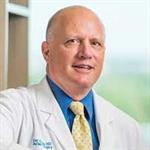 Dr. Kenneth Liechty is the Sandy Wolf Chair in Maternal Fetal Surgery and Director of the Colorado Fetal Care Center for Children’s Hospital at CU Anschutz. Dr. Liechty was awarded a second Grubstake Award to develop his platform technology for the treatment of acute lung injury leading to Acute Respiratory Distress Syndrome (ARDS). ARDS causes 150,000 adult ICU admissions and 75,000 deaths annually in the US. Currently, treatment for ARDS is palliative, and does not address the underlying causes. Dr. Liechty and his team have shown that their nanoparticle therapy is able to regenerate healthy lung tissue in a mouse model of acute lung injury. The Grubstake Award will allow them to develop an inhaled version of the nanoparticle therapy and do the additional safety studies required prior to a clinical trial in ARDS patients. Dr. Liechty is in the process of exclusively licensing this technology into Ceria Therapeutics, Inc.
Dr. Kenneth Liechty is the Sandy Wolf Chair in Maternal Fetal Surgery and Director of the Colorado Fetal Care Center for Children’s Hospital at CU Anschutz. Dr. Liechty was awarded a second Grubstake Award to develop his platform technology for the treatment of acute lung injury leading to Acute Respiratory Distress Syndrome (ARDS). ARDS causes 150,000 adult ICU admissions and 75,000 deaths annually in the US. Currently, treatment for ARDS is palliative, and does not address the underlying causes. Dr. Liechty and his team have shown that their nanoparticle therapy is able to regenerate healthy lung tissue in a mouse model of acute lung injury. The Grubstake Award will allow them to develop an inhaled version of the nanoparticle therapy and do the additional safety studies required prior to a clinical trial in ARDS patients. Dr. Liechty is in the process of exclusively licensing this technology into Ceria Therapeutics, Inc.
- Kunhua Song, Ph.D.: Heart Regeneration by Conversion of Non-Myocytes into Functional Cardiomyocytes
 Dr. Kunhua Song, an Assistant Professor at CU Anschutz, was awarded a Grubstake Award to develop a genetic therapy for the treatment of heart failure. Eight million Americans suffer a heart attack annually; that is 3% of adults in the US. The annual cost for treating heart attacks is $12 billion, making it the most expensive condition treated in hospitals in the US. Even worse, 30-40% of heart attack patients develop heart failure, accounting for about 50% of all heart failure patients. The five-year survival rate for heart failure patients is only 50%. Despite the development of various therapies and medical devices such as the Left Ventricular Assist Device, the five-year survival rate has not changed in the past 20 years. Dr. Kunhua Song and his team have discovered a way to regenerate healthy cardiac cells from the fibrotic tissue causing heart failure using a gene therapy approach. The Grubstake Award will allow them to complete their animal studies and begin preparing to file an IND to enter clinical trials.
Dr. Kunhua Song, an Assistant Professor at CU Anschutz, was awarded a Grubstake Award to develop a genetic therapy for the treatment of heart failure. Eight million Americans suffer a heart attack annually; that is 3% of adults in the US. The annual cost for treating heart attacks is $12 billion, making it the most expensive condition treated in hospitals in the US. Even worse, 30-40% of heart attack patients develop heart failure, accounting for about 50% of all heart failure patients. The five-year survival rate for heart failure patients is only 50%. Despite the development of various therapies and medical devices such as the Left Ventricular Assist Device, the five-year survival rate has not changed in the past 20 years. Dr. Kunhua Song and his team have discovered a way to regenerate healthy cardiac cells from the fibrotic tissue causing heart failure using a gene therapy approach. The Grubstake Award will allow them to complete their animal studies and begin preparing to file an IND to enter clinical trials.
- Michael Verneris, M.D.: Generation of Engraftable Hematopoietic Stem Cells from Induced Pluripotent Stem Cells
 Dr. Michael Verneris is the Director of Bone Marrow Transplantation and Cellular Therapy and the Barton Family Endowed Chair of Bone Marrow Transplant at CU Anschutz. Dr. Verneris was awarded a Grubstake Award to development his technology for use in bone marrow transplantation. Bone marrow transplants are a high risk, expensive procedure (>$13 billion) used to treat leukemia, lymphoma, and genetic diseases. Two thirds of patients receive transplants from unrelated donors, which causes delays to find matching donors, and increases the complications and cost associated with the procedure. Recently, scientists have discovered how to create induced pluripotent stem cells (iPS cells) from a patient’s own cells, expand them, and convert them to bone marrow cells. However, these cells have not been successful at engrafting into the bone marrow in mouse models, indicating they would not be effective in a bone marrow transplant in patients. Dr. Verneris and his team have discovered that adding a small molecule during the conversion of the iPS cells allows engraftment of the cells in the mouse model. The Grubstake Award will allow them to confirm their initial finding in animal models, and to determine the most promising small molecule for clinical and commercial use.
Dr. Michael Verneris is the Director of Bone Marrow Transplantation and Cellular Therapy and the Barton Family Endowed Chair of Bone Marrow Transplant at CU Anschutz. Dr. Verneris was awarded a Grubstake Award to development his technology for use in bone marrow transplantation. Bone marrow transplants are a high risk, expensive procedure (>$13 billion) used to treat leukemia, lymphoma, and genetic diseases. Two thirds of patients receive transplants from unrelated donors, which causes delays to find matching donors, and increases the complications and cost associated with the procedure. Recently, scientists have discovered how to create induced pluripotent stem cells (iPS cells) from a patient’s own cells, expand them, and convert them to bone marrow cells. However, these cells have not been successful at engrafting into the bone marrow in mouse models, indicating they would not be effective in a bone marrow transplant in patients. Dr. Verneris and his team have discovered that adding a small molecule during the conversion of the iPS cells allows engraftment of the cells in the mouse model. The Grubstake Award will allow them to confirm their initial finding in animal models, and to determine the most promising small molecule for clinical and commercial use.
- Valeria Canto-Soler, Ph.D.: Stem Cell-Derived Retinal Transplant to Treat Dry-AMD
 Dr. Valeria Canto-Soler is the director of CellSight, the Ocular Stem Cell and Regenerative Research Program in partnership with the Gates Center and Department of Ophthalmology at CU Anschutz. Dr. Canto-Soler was awarded a Grubstake Award for a stem cell-derived retinal transplant to treat dry, age-related macular degeneration. She hopes that one day her research will uncover the cure to blindness through transplanting retinal patches in patients’ eyes.
Dr. Valeria Canto-Soler is the director of CellSight, the Ocular Stem Cell and Regenerative Research Program in partnership with the Gates Center and Department of Ophthalmology at CU Anschutz. Dr. Canto-Soler was awarded a Grubstake Award for a stem cell-derived retinal transplant to treat dry, age-related macular degeneration. She hopes that one day her research will uncover the cure to blindness through transplanting retinal patches in patients’ eyes.
- Karin Payne, Ph.D.: Bioresorbable 3-D Printed Personalized Implant for Cartilage Regeneration in Pediatric Growth Plate Injuries
 Dr. Karen Payne is an assistant professor within the CU Anschutz Department of Orthopedics and is also the lab director for the Payne Regenerative Orthopedics Laboratory. Her lab focuses on the regenerative potential of stem cells for bone and articular cartilage tissue engineering to enhance bone fracture repair, improve spine function, and treat articular cartilage defects. Dr. Payne was awarded a Gates Grubstake Award for a bioresorbable 3-D printed personalized implant for cartilage regeneration in pediatric growth plate injuries.
Dr. Karen Payne is an assistant professor within the CU Anschutz Department of Orthopedics and is also the lab director for the Payne Regenerative Orthopedics Laboratory. Her lab focuses on the regenerative potential of stem cells for bone and articular cartilage tissue engineering to enhance bone fracture repair, improve spine function, and treat articular cartilage defects. Dr. Payne was awarded a Gates Grubstake Award for a bioresorbable 3-D printed personalized implant for cartilage regeneration in pediatric growth plate injuries.
- Martin Zamora, Ph.D.: Clinical Development of Autologous CD117+ Progenitor Cell Therapy for Solid Organ Transplantation
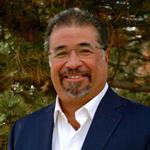 Dr. Martin Zamora, now Professor Emeritus at CU Anschutz, joined the Division of Pulmonary Sciences and Critical Care in 1990 and served as directing pulmonologist for the Lung Transplant Program since it was founded in 1991. Dr. Zamora was awarded a Grubstake Award for clinical development of autologous CD117+ progenitor cell therapy for solid organ transplantation. His research aims to improve outcomes and quality of life following organ transplantation. Dr. Zamora, together with Robert Plenter, is in the process of preparing a pre-IND package for filing with the FDA for the use of the technology in preventing transplant rejection following solid organ transplant.
Dr. Martin Zamora, now Professor Emeritus at CU Anschutz, joined the Division of Pulmonary Sciences and Critical Care in 1990 and served as directing pulmonologist for the Lung Transplant Program since it was founded in 1991. Dr. Zamora was awarded a Grubstake Award for clinical development of autologous CD117+ progenitor cell therapy for solid organ transplantation. His research aims to improve outcomes and quality of life following organ transplantation. Dr. Zamora, together with Robert Plenter, is in the process of preparing a pre-IND package for filing with the FDA for the use of the technology in preventing transplant rejection following solid organ transplant.
- Jeffrey Olson, M.D.: Intraocular Device to Potentiate Retinal Stem Cell Transplantation in Macular Degeneration
 Dr. Jeffrey Olson, an Associate Professor and Vitreoretinal Surgeon at CU Anschutz, was awarded a Grubstake Award to develop an intraocular medical device to protect retinal cells from damage and cell death for diseases with unmet medical needs such as dry Age-related Macular Degeneration. To continue development, Dr. Olson has established AmpVision, LLC, and is in the process of exclusively licensing this technology into AmpVision. Dr. Olson is actively working with the FDA to prepare for starting clinical trials.
Dr. Jeffrey Olson, an Associate Professor and Vitreoretinal Surgeon at CU Anschutz, was awarded a Grubstake Award to develop an intraocular medical device to protect retinal cells from damage and cell death for diseases with unmet medical needs such as dry Age-related Macular Degeneration. To continue development, Dr. Olson has established AmpVision, LLC, and is in the process of exclusively licensing this technology into AmpVision. Dr. Olson is actively working with the FDA to prepare for starting clinical trials.
- Kenneth Liechty, M.D.: Conjugated Nanoceria to Treat Oxidative Stress and Prevent Chronic Inflammation
 Dr. Kenneth Liechty is the Sandy Wolf Chair in Maternal Fetal Surgery and Director of the Colorado Fetal Care Center for Children’s Hospital at CU Anschutz. Dr. Liechty was awarded a Grubstake Award to develop a platform technology useful for treating a variety of diseases where inflammation and oxidative stress are pathognomonic in the progression of the disease. Dr. Liechty’s initial focus is treatment of diabetic ulcers, where compelling in vitro and animal model data exists showing that treatment results in closure rates of diabetic wounds equal to nondiabetic wounds. Dr. Liechty has already filed his pre-IND package with the FDA for this indication, and is currently working on his IND package. To continue development of this technology, Dr. Liechty has established Ceria Therapeutics, Inc., and is in the process of exclusively licensing this technology into Ceria.
Dr. Kenneth Liechty is the Sandy Wolf Chair in Maternal Fetal Surgery and Director of the Colorado Fetal Care Center for Children’s Hospital at CU Anschutz. Dr. Liechty was awarded a Grubstake Award to develop a platform technology useful for treating a variety of diseases where inflammation and oxidative stress are pathognomonic in the progression of the disease. Dr. Liechty’s initial focus is treatment of diabetic ulcers, where compelling in vitro and animal model data exists showing that treatment results in closure rates of diabetic wounds equal to nondiabetic wounds. Dr. Liechty has already filed his pre-IND package with the FDA for this indication, and is currently working on his IND package. To continue development of this technology, Dr. Liechty has established Ceria Therapeutics, Inc., and is in the process of exclusively licensing this technology into Ceria.
- David Wagner, Ph.D.: A 15-Amino Acid Peptide to Potentially Stop Demyelination and Restore Myelin Production in Multiple Sclerosis
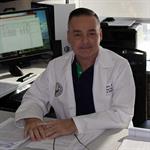 Dr. David Wagner, an Associate Professor in the Webb-Waring Center at CU Anschutz, was awarded a Grubstake Award to develop a platform technology useful for treating a variety of autoimmune diseases including multiple sclerosis by blocking aberrant immune signaling. To continue development of this technology, Dr. Wagner established OpT, LLC, obtained two SBIR Phase II grants, and exclusively licensed this technology into OpT. Dr. Wagner has prepared and filed a pre-IND document with the FDA for the use of the proprietary peptide for the treatment of Type I diabetes, and is in the process of developing his IND package for filing with the FDA.
Dr. David Wagner, an Associate Professor in the Webb-Waring Center at CU Anschutz, was awarded a Grubstake Award to develop a platform technology useful for treating a variety of autoimmune diseases including multiple sclerosis by blocking aberrant immune signaling. To continue development of this technology, Dr. Wagner established OpT, LLC, obtained two SBIR Phase II grants, and exclusively licensed this technology into OpT. Dr. Wagner has prepared and filed a pre-IND document with the FDA for the use of the proprietary peptide for the treatment of Type I diabetes, and is in the process of developing his IND package for filing with the FDA.
- Ganna Bilousova, Ph.D., and Igor Kogut, Ph.D.: Induced Pluripotent Stem Cell Services as a Platform for Clinical Research
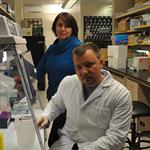 Dr. Ganna Bilousova and Dr. Igor Kogut, Assistant Professors at CU Anschutz, were awarded a Grubstake Award to develop a method to generate iPSCs in a clinically viable manner from a small number of cells, and without requiring genetic modifications. They have continued their work, developing a method of combined reprogramming and genetic correction currently being developed for use in the treatment of Epidermolysis bullosa (EB), a skin blistering disease without effective treatment. They are working with Dr. Dennis Roop, Director of the Gates Center for Regenerative Medicine, to prepare a pre-IND package to file with the FDA for the use of gene corrected keratinocytes for the treatment of EB. Dr. Bilousova and Dr. Kogut have also established the Stem Cell Biobank and Disease Modeling Core at CU Anschutz to provide access to their technology to scientists at CU Anschutz and worldwide.
Dr. Ganna Bilousova and Dr. Igor Kogut, Assistant Professors at CU Anschutz, were awarded a Grubstake Award to develop a method to generate iPSCs in a clinically viable manner from a small number of cells, and without requiring genetic modifications. They have continued their work, developing a method of combined reprogramming and genetic correction currently being developed for use in the treatment of Epidermolysis bullosa (EB), a skin blistering disease without effective treatment. They are working with Dr. Dennis Roop, Director of the Gates Center for Regenerative Medicine, to prepare a pre-IND package to file with the FDA for the use of gene corrected keratinocytes for the treatment of EB. Dr. Bilousova and Dr. Kogut have also established the Stem Cell Biobank and Disease Modeling Core at CU Anschutz to provide access to their technology to scientists at CU Anschutz and worldwide.
- Steven Dow, DVM, Ph.D., and Mary Ann DeGroote, M.D.: Antimicrobial Stem Cell Therapy for Infected Diabetic Foot Ulcers
 Dr. Steven Dow, the Director, Center for Immune and Regenerative Medicine at CSU, and Dr. Mary Ann DeGroote, and Assistant Professor at CSU, were awarded a Grubstake Award to develop their activated mesenchymal stromal cell (MSC) product for use in antibiotic resistant non-healing wounds. Dr. Dow is in the process of preparing his pre-IND package to file with the FDA for the use of activated MSCs to treat antibiotic-resistant chronic orthopedic infections. To continue development, Dr. Dow has established Validus Cellular Therapeutics, Inc., and is in the process of exclusively licensing this technology into Validus.
Dr. Steven Dow, the Director, Center for Immune and Regenerative Medicine at CSU, and Dr. Mary Ann DeGroote, and Assistant Professor at CSU, were awarded a Grubstake Award to develop their activated mesenchymal stromal cell (MSC) product for use in antibiotic resistant non-healing wounds. Dr. Dow is in the process of preparing his pre-IND package to file with the FDA for the use of activated MSCs to treat antibiotic-resistant chronic orthopedic infections. To continue development, Dr. Dow has established Validus Cellular Therapeutics, Inc., and is in the process of exclusively licensing this technology into Validus.
- Karin Payne, Ph.D., and Vikas Patel, M.D.: Structural Living Bone Allografts to Enhance Bone Formation in Orthopedic Surgery
 Dr. Karin Payne, an Assistant Professor, and Dr. Patel, the Chief of Orthopedic Spine Surgery at CU Anschutz, were awarded a Grubstake Award to develop approaches to enhance bone formation in orthopedic surgery.
Dr. Karin Payne, an Assistant Professor, and Dr. Patel, the Chief of Orthopedic Spine Surgery at CU Anschutz, were awarded a Grubstake Award to develop approaches to enhance bone formation in orthopedic surgery.
- Xiao-Jing Wang, M.D., Ph.D.: Fusion Protein to Treat Chronic Wounds and Inflammatory Disorders
 Dr. Xiao-Jing Wang is the John Gates Endowed Chair of Cancer Stem Cell Biology and Director of the Head & Neck Cancer Research Program CU Anschutz. Dr. Wang was awarded a Grubstake Award to develop Smad7-based fusion proteins for clinical use in several indications with unmet medical needs including oral mucositis, psoriasis, chronic wounds, scar prevention, and fibrotic diseases. To continue development of the technology, Dr. Wang founded Allander Biotechnologies, LLC and exclusively licensed this intellectual property portfolio. She has continued to develop the technology using funds from angel investors and two SBIR Phase II grants.
Dr. Xiao-Jing Wang is the John Gates Endowed Chair of Cancer Stem Cell Biology and Director of the Head & Neck Cancer Research Program CU Anschutz. Dr. Wang was awarded a Grubstake Award to develop Smad7-based fusion proteins for clinical use in several indications with unmet medical needs including oral mucositis, psoriasis, chronic wounds, scar prevention, and fibrotic diseases. To continue development of the technology, Dr. Wang founded Allander Biotechnologies, LLC and exclusively licensed this intellectual property portfolio. She has continued to develop the technology using funds from angel investors and two SBIR Phase II grants.
- Antonio Jimeno, M.D., Ph.D.: Proprietary Humanized Mouse Model to Assess Cancer Treatments
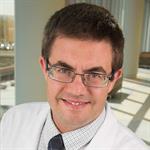 Dr. Antonio Jimeno is the Director of the Developmental Therapeutics/ Pharmacodynamic Laboratory at CU Anschutz. Dr. Jimeno was awarded a Grubstake Award to develop humanized mouse models to identify improved cancer treatments.
Dr. Antonio Jimeno is the Director of the Developmental Therapeutics/ Pharmacodynamic Laboratory at CU Anschutz. Dr. Jimeno was awarded a Grubstake Award to develop humanized mouse models to identify improved cancer treatments.
Gates Institute
CU Anschutz
Anschutz Health Sciences Building
1890 N Revere Ct
Mailstop L606
Aurora, CO 80045
303-724-1494
Gates Biomanufacturing Facility
12635 East Montview Blvd
Suite 380
Aurora, CO 80045
303-724-1494
Clinicians and Researchers
Students and Interns
CMS Login